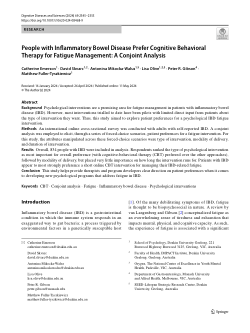A recent study published in the journal *Digestive Diseases and Sciences* highlights the preferences of individuals with Inflammatory Bowel Disease (IBD) regarding fatigue management. Conducted by researchers Catherine Emerson, David Skvarc, Antonina Mikocka-Walus, Lisa Olive, PR Gibson, and Matthew Fuller-Tyszkiewicz, the study utilized a conjoint analysis approach to gauge the treatment preferences of IBD patients.
The analysis revealed that Cognitive Behavioral Therapy (CBT) emerged as the favored intervention for managing fatigue, a common and debilitating symptom among those diagnosed with IBD. Participants expressed a strong preference for psychological interventions that focus on altering thought patterns and behaviors associated with fatigue. This preference for CBT indicates an acknowledgment of the psychological components of managing chronic illness.
The study’s findings are significant, as they point to the need for healthcare providers to incorporate CBT into treatment plans for IBD patients experiencing fatigue. The researchers emphasized that CBT not only addresses fatigue but also helps in managing related symptoms of depression and anxiety, which often accompany chronic conditions like IBD.
Data from the analysis indicated that patients felt more optimistic about their fatigue management when psychological therapies, such as CBT, were included in their treatment options. This underscores the importance of considering patient preferences in treatment planning, particularly for chronic illnesses where fatigue can severely impact quality of life.
The research also suggests that integrating CBT into standard care for IBD patients could lead to improvement in overall health outcomes. By prioritizing effective and preferred therapy options like CBT, healthcare systems can enhance patient satisfaction and adherence to treatment protocols.
As IBD continues to affect millions worldwide, understanding patient preferences for fatigue management will be essential in developing comprehensive care strategies that address both physical and mental health needs. This study lays the groundwork for future research into tailored treatment approaches that incorporate patient feedback in therapeutic decisions.


